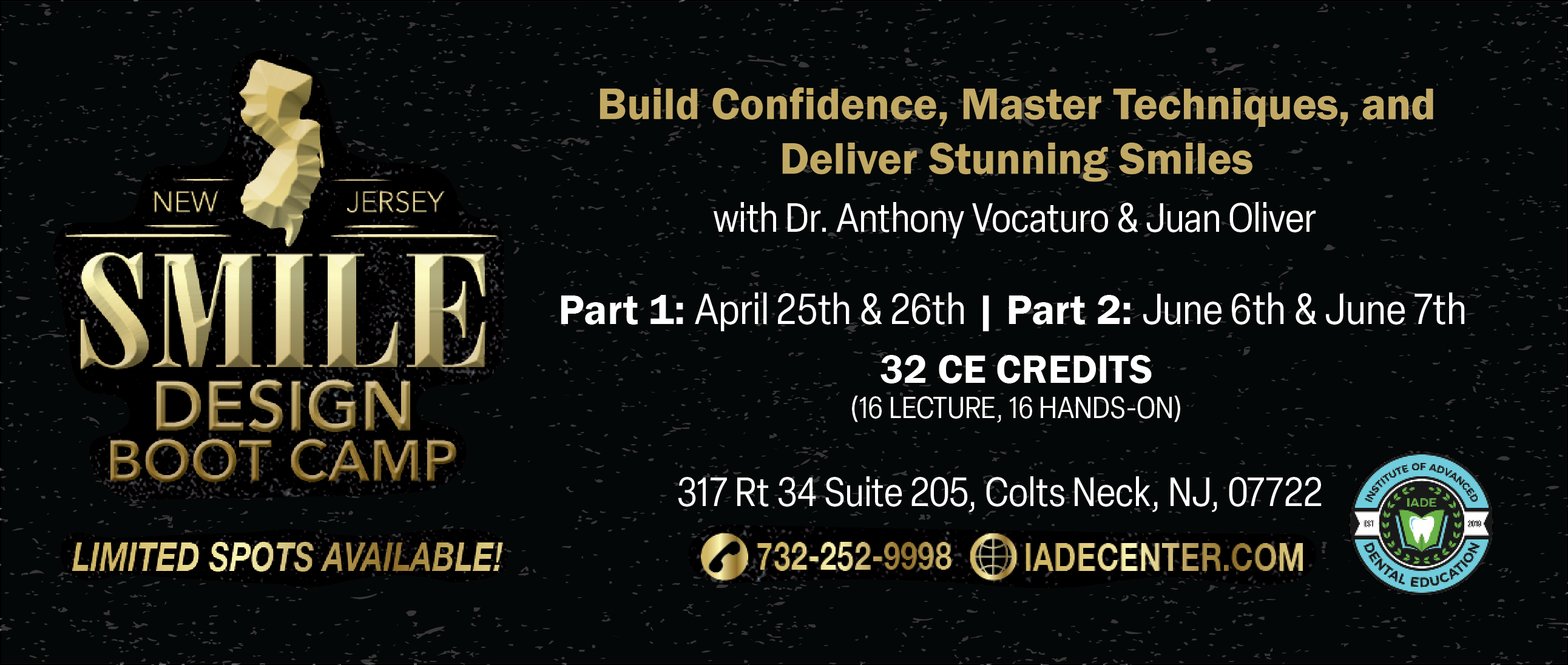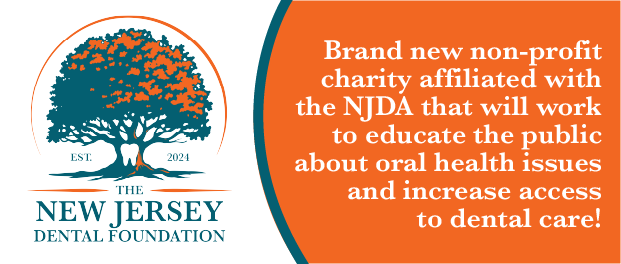Perfect Smiles Start With You
Smile Design Boot Camp is an intensive 4-day course that equips dentists with the confidence and knowledge to incorporate techniques for single-arch and full mouth rehabilitation into their practice. Sign up to secure a spot!
It's a NEW Convention!
Registration is now open for NJDA’s Annual Convention in Bridgewater on May 16-17! Our annual gathering of the NJ dental community will feature top-tier CE courses on a wide range of topics, a rooftop party, and more.
The Party of the Year!
The NDJA Celebration on May 16 is going to be huge! We are taking over the entire 7th floor of the AC Hotel including three bars, outside patio, pool table, DJ and dance floor!
New Jersey Dental Foundation
Take a moment to learn more about NJDA's brand new initiative to help the public learn more and gain access to oral healthcare! Read the mission statement, governance, structure and more.
This is membership your way
Renew today to explore new lower membership costs and customization offerings.
Helping Members Succeed
The New Jersey Dental Association is the voice of the dental profession and a strong proponent of oral health in the state. Members are part of a vibrant community of dentists encompassing 12 local dental societies as well as the American Dental Association. Members engage in educational programs, have access to dentist-centric relationships and tools to navigate the business of dentistry and their careers, as well as benefit from dedicated advocacy that protects the interests of the profession. The organization is run by member-dentists with the support of a team of professionals at NJDA Headquarters. NJDA members never practice alone!
UPCOMING EVENTS
DENTAL NEWS AND NOTES
Flex Your Hands
Reducing Hand Pain
Dentists, dental hygienists and dental assistants may experience hand pain in doing dental procedures. Hand pain may include throbbing, aching, altered sensation, stiffness or diminished strength. Although pain in the hand can originate from problems in the arm, shoulder area or neck, and from systemic diseases, pain that originates in the hand itself is frequently due to either osteoarthritis or tendonitis. As always, consult a physician for any persistent problem, but here is an overview of these common complaints.
Osteoarthritis is characterized by slight misalignment of finger and thumb joints, erosion of joint cartilage and eventual inflammation, swelling and pain. The problem can occur in any of the finger joints, but is most common in the basal joint of the thumb and the distal joints of the fingers. The pain may be first noticed during physical activities such as gripping and maneuvering instruments, but can become persistent or episodic.
Tendonitis is characterized by inflammation of tendons and possible development of nodules on the tendons that impede smooth movement of the tendon through the tendon sheath. Pain and weakness may initially be experienced when gripping objects, as well as stiffness in flexing and extending the joint. Tendonitis may occur acutely or can become a chronic condition. The physical demands and the hand motions used in providing oral health care may aggravate tendonitis and osteoarthritis.
The following are examples of hand motions that may aggravate hand pain:
- Gripping instruments that have slim handles, such as periodontal probes, explorers, scalers, curettes, and endodontic files
- Gripping instruments tightly by pinching with the thumb and finger(s)
- Gripping instruments with static intensity for a long period of time. This can happen when doing procedures that require precise, small movements, such as working in small areas, while trying to prevent injury to surrounding tissues
- Gripping vibrating instruments, such as a rotary hand piece, over a long period of time.
- Lifting heavy objects or doing forceful movements with the finger(s), such as tooth extraction or using heavier instruments.
- Doing procedures that require torqueing motions in the wrist and hand, such as cleaning root canals.
- Doing procedures that require repetitive motion over a long period of time, such as scaling teeth
- Using the fingers while the wrist is held in a non-neutral position, especially a flexed position for a long period of time. This is most commonly done while scaling teeth.
Below is a list of tips for lessening the physical demands on the hand:
- Use instruments that perform many of the functions the hand would ordinarily perform and so reduce movements of the hand; such instruments are those that swivel and reduce torque.
- Use instruments that lessen the time the hand must be used, such as instruments that have variable and rapid speeds.
- Use instruments that reduce stress on the hand, such as those that are vibration free, lightweight, and have enlarged handles
- Use instruments that improve access to the work area, such as instruments that provide bright or intense illumination, magnification, multiple spray ports.
- Reduce the time spent doing the same task. For example, take a ten minute break at least once every hour from doing tasks requiring grip.
- Use hand stabilizing techniques when doing precise hand tasks.
- After completing a task that required intense grip, gently stretch the hand, especially the area between the thumb and first finger.
- If pain continues to worsen, consider seeing a physician for a medical evaluation and treatment of the condition. A splint might provide support of the hand.
Contact Us
Phone: 732-821-9400 or dial the Staff Directly
Fax: 732-821-1082 | Email: info@njda.org | Follow us @NJDentalAssoc
One Dental Plaza, North Brunswick, NJ 08902













